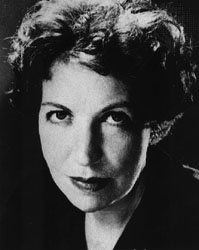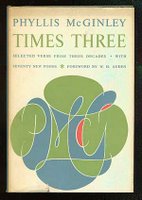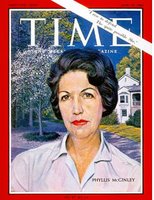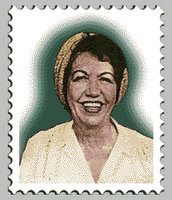 On this date (March 22) in 1905, the Pulitzer-Prize winning poet, Phyllis McGinley was born in Orgeon.
On this date (March 22) in 1905, the Pulitzer-Prize winning poet, Phyllis McGinley was born in Orgeon.A writer whose poetry specialty was light verse and whose essays were as uplifting and wholesome as they were finely tuned, McGinley was a wonderful source of support to traditional feminine values when those values were under heavy assault in the 50's and 60's. In fact, her popular collection of personal essays, Sixpence In Her Shoe, was a wry and well-aimed answer to Betty Friedan's 1963 The Feminine Mystique. Friedan disparaged the idea that intelligent women should desire a career of being a full-time wife and mother but McGinley roundly applauded such a calling. She insisted that stewardship of the home was as noble and valuable a contribution as women could make and one that, properly served, required every bit of intelligence, skill, strength, imagination, and compassion that any business or profession could elicit. Sixpence In Her Shoe proved that many American women agreed. Without publicity or media attention at all, it was on the best-seller list for months.
Phyllis McGinley had been writing since she was a young girl but after finally beginning to sell poems for publication, she moved to New York City when she was 24. She wrote while also holding down such jobs as copywriting at an advertising agency and teaching in a junior high school. Eventually she landed on the staff of Town and Country magazine as Poetry Editor where, if she wasn't paid so handsomely, she was at least better situated to hone her craft. Her first book of poetry, On The Contrary, was published in 1934. It was the first of many including: One More Manhattan (1937); A Pocketful of Wry (1940); Stones from a Glass House (1946); Love Letters (1954); and Confessions of a Reluctant Optimist (1973). McGinley also wrote three books of essays: the aforementioned Sixpence in Her Shoe (1964) as well as The Province of the Heart (1959) and her last published work, Saint-Watching (1969). Those interested in McGinley will a
 lso want to look for her collection, Times Three: Selected Verse from Three Decades with Seventy New Poems (1960). It was for this that she received her Pulitzer the following year.
lso want to look for her collection, Times Three: Selected Verse from Three Decades with Seventy New Poems (1960). It was for this that she received her Pulitzer the following year.In noteworthy addition to Phyllis McGinley's professional productivity is her warm and successful life as wife and mother. Her husband, Charles L. Hayden, was working for the telephone company when they first met but spending his nights as a jazz pianist. They married in June of 1937 and raised two daughters. Charles died in 1972, after which Phyllis moved from Larchmont into an apartment in the City. She passed away on February 22, 1978.
Phyllis McGinley is an example of the writers -- great and important writers -- whose work is very much in danger of being lost to succeeding generations. Yes, as the Time magazine cover and the Oregon state commemorative stamp (shown below) illustrate, Phyllis McGinley made her mark but without the efforts of others, that mark will be sadly erased by inferior products. Therefore, this essay to honor Phyllis McGinley on her birthday AND an encouragement to readers of The Book Den to explore yet further her delightful and provocative work.
Here's a start -- a page of Phyllis McGinley's works available at Amazon. There you can even find an audio recording of poets Ogden Nash, Dorothy Parker and Phyllis McGinley reading their own work.

And here are a few quotations from Phyliss McGinley, followed by one of her comic poems:
Those wearing Tolerance for a label call other views intolerable.
Women are not men's equals in anything except responsibility. We are not their inferiors, either, or even their superiors. We are quite simply different races.
Marriage was all a woman's idea and for man's acceptance of the pretty yoke, it becomes us to be grateful.
Our bodies are shaped to bear children, and our lives are a working out of the processes of creation. All our ambitions and intelligence are beside that great elemental point.
Getting along with men isn't what's truly important. The vital knowledge is how to get along with a man. One man.
 Intimations of Mortality
Intimations of Mortality(on being told by the dentist that this will be over soon)
Indeed, it will soon be over, I shall be done
With the querulous drill, the forceps, the clove-smelling cotton.
I can go forth into fresher air, into sun,
This narrow anguish forgotten.
In twenty minutes or forty or half an hour,
I shall be easy, and proud of my hard-got gold,
But your apple of comfort is eaten by worms, and sour.
Your consolation is cold.
This will not last, and the day will be pleasant after.
Ill dine tonight with a witty and favorite friend.
No doubt tomorrow I shall rinse my mouth with laughter.
And also that will end.
The handful of time that I am charily granted
Will likewise pass, to oblivion duly apprenticed.
Summer will blossom and autumn be faintly enchanted.
Then time for the grave, or the dentist.
Because you are shrewd, my man, and your hand is clever,
You must not believe your words have a charm to spell me.
There was never a half of an hour that lasted forever.
Be quiet. You need not tell me.